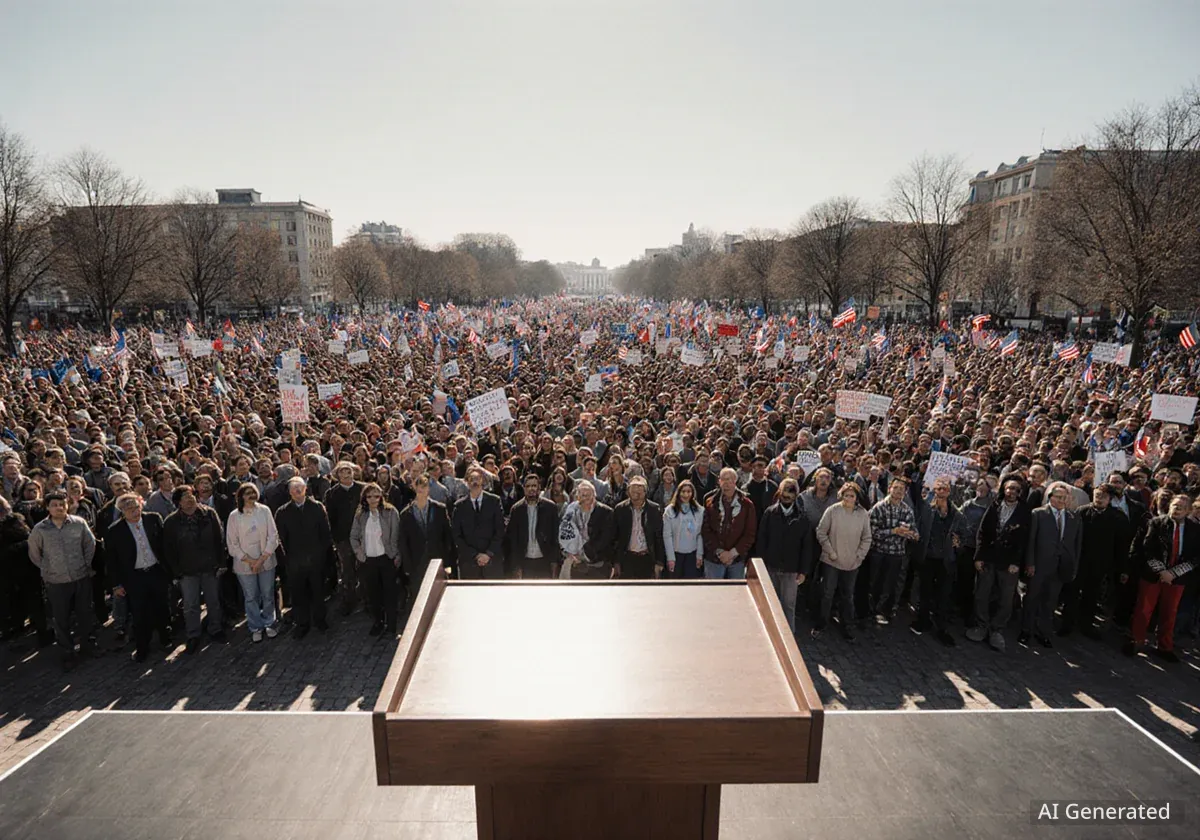Republican members of Congress from Colorado are navigating a difficult political landscape following President Donald Trump's decision to relocate the U.S. Space Command headquarters from Colorado Springs to Alabama. The move, which could affect thousands of jobs and a significant part of the state's economy, has placed these officials between their party's leader and the interests of their constituents.
Key Takeaways
- President Trump announced the U.S. Space Command headquarters will move from Colorado to Alabama, citing Colorado's mail-in ballot system as a factor.
- The decision creates a political dilemma for Colorado Republicans, who risk voter backlash if they don't oppose the move and presidential disfavor if they do.
- The aerospace and defense sector represents about 40% of the Colorado Springs economy, making the relocation a major economic issue for the state.
- Democrats are using the decision as a key point of attack against incumbent Republicans ahead of the next election cycle.
A Calculated Response from Colorado Republicans
When U.S. Rep. Jeff Crank of Colorado Springs began his first term, he vowed to challenge any attempt by the Trump administration to move the U.S. Space Command headquarters out of his district. However, following the president's official announcement, Crank's approach has shifted from confrontation to damage control.
In public statements, Crank expressed disappointment but also sought to highlight potential positive outcomes. He suggested that the total number of relocated positions might be lower than first estimated and that other Space Force missions in the area could expand. This measured tone reflects the complex situation facing Colorado Republicans.
"I don’t think there’s any question that our Republican legislators are in a tough spot," said John Suthers, a Republican and the former mayor of Colorado Springs. "They disagree with the decision. It’s a wholly political decision. But for purposes of their own political careers, they have to be guarded in what they say."
Suthers, who now works with the law and lobbying firm Brownstein Hyatt Farber Schreck, noted that opposing President Trump directly could lead to severe political consequences, including lost endorsements, primary challengers, and a reduction in campaign funding. It could also jeopardize future federal projects for the state.
The Economic Impact on Colorado Springs
The decision to move U.S. Space Command is more than a political issue; it carries significant economic weight for Colorado. The command is responsible for critical national security functions, including satellite operations, missile warnings, and global military communications.
Colorado's Aerospace Economy by the Numbers
- Direct Jobs: U.S. Space Command is linked to nearly 1,400 jobs in Colorado.
- Annual Economic Impact: The command contributes an estimated $1 billion to the state's economy each year.
- Regional Importance: The aerospace and defense industries account for at least 40% of the economy in Colorado Springs, employing more than 110,000 people.
Source: Denver Metro Chamber of Commerce, Colorado Springs Chamber of Commerce
These figures underscore why the relocation is a major concern for local leaders and residents. The potential loss of high-paying jobs and the ripple effect on the local economy have become central to the debate.
A Series of Reversals
The location of the permanent U.S. Space Command headquarters has been a point of contention for years. Near the end of his first term, President Trump announced the move to Alabama. President Joe Biden later reversed that decision, keeping the command in its temporary home of Colorado Springs. The most recent announcement from President Trump marks another reversal, reigniting the debate.
Political Fallout and Campaign Attacks
Colorado Democrats have quickly seized on the issue, framing the relocation as a failure of Republican leadership. They are using the decision to challenge incumbent Republicans, arguing they have been ineffective in protecting the state's interests.
Jessica Killin, an Army veteran running against Rep. Crank, called the relocation proof of his ineffectiveness. "I thought that all of this crazy political kowtowing that he was doing was to hopefully keep Space Command here," Killin said in an interview. "But I find it amazing that he couldn’t even do that."
Targeting Other Incumbents
The criticism extends beyond Crank's district. Democratic state Rep. Manny Rutinel attacked U.S. Rep. Gabe Evans, stating, "President Trump just sacrificed Colorado’s Space Command HQ to play politics, and Gabe Evans has done almost nothing to stop him."
Similarly, Democrat Trisha Calvarese launched a fundraising campaign with the headline "Boebert cost Colorado Space Command," accusing U.S. Rep. Lauren Boebert of failing to prevent the move. For her part, Boebert told Colorado Public Radio that the relocation seems to be a "done deal" but insisted that Colorado's broader defense and aerospace industries remain strong.
The Path Forward
Despite the official announcement, some believe the fight is not concluded. Former Mayor Suthers pointed out that the physical relocation will take years to complete, leaving a window for future changes. With a midterm election approaching and a presidential term ending in early 2029, political dynamics could shift again.
Suthers suggested that quiet, behind-the-scenes efforts might be more effective than public confrontation in influencing the outcome. He hinted that Colorado's Republican congressional members may be exploring ways to delay or complicate the process administratively.
Citing the famous words of baseball player Yogi Berra, Suthers remarked, "it ain’t over till it’s over." For now, Colorado's political leaders and its vital aerospace community remain in a state of uncertainty, watching to see how the final decision unfolds.





